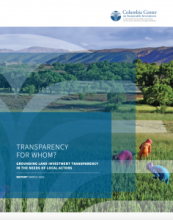Land Library
Welcome to the Land Portal Library. Explore our vast collection of open-access resources (over 74,000) including reports, journal articles, research papers, peer-reviewed publications, legal documents, videos and much more.
/ library resources
Showing items 1 through 9 of 300.New research by CCSI and the Centre pour l’Environnement et le Développement (CED) on transparency of land-based investment in Cameroon.
In the report, CCSI and CED find that:
Transparency is often seen as a means of improving governance and accountability of investment, but its potential to do so is hindered by vague definitions and failures to focus on the needs of key local actors.
The paper critically engages with sustainable development goal targets (SDG-2- Target 2.3; SDG-5) to examine how and why large-scale agricultural land acquisitions modify the social relations of women’s food access.
This policy brief provides details of the United Nations Special Rapporteur recommendations regarding how governments can upgrade informal settlements within a human rights-based framework.
This note proves recommendations for governments, international actors, and mining advocates who seek to optimize the value of green energy mineral reserves, to ensure that expectations for green energy materials do not replace careful planning, impact assessment, and allocation of risks, as well
Despite an inflow of investment in rural communities, there are concerns about negative impacts on local people’s livelihoods, access to farming land, productivity, income levels, food security and access to social services.
The movement to secure women’s land rights in Senegal needs to take into account the rights of all sections of the targeted communities. Hence, the cases presented testify to specific situations along with evaluations of initiatives targeting improvement of women’s land rights.
This report summarizes the implementation activities, “policy intersections” and the subsequent production of a draft model Land Use Bill (LUB, 2018) for Nigeria.
Government intervention and local level coordination of large-scale investment decisions are important components required for positive impacts on food security, nutrition and livelihoods of host communities.









